“The Other”
By Sally Bliumis-Dunn
The poems in this feature look at how a certain distance or feeling of seeming “otherness” between the speaker and her/his/their subject can sometimes transform into a kind of unexpected intimacy, insight, understanding. Whether these poems are set in a taxi cab, pride parade, a prison, a city street or even if the poem discovers a certain otherness in the self, they are each a petri dish for building understanding in unlikely circumstances.
I was drawn to this topic at this time in particular when our political and social world seems so sadly polarized. I am so grateful to each poet for their generosity in both providing their poem and the speaking about the particular nature of “otherness” within it.
A special thank you to Betsy Sholl because the idea for this feature arose in a conversation we had during a walk on the Maine shore. And a second thank you to Bob Hicok for giving me his poem, “a theory” which acts as a door into this idea and calls into question the whole idea of whether otherness in fact exists at all among us.
BOB HICOK
A theory
Everyone is something.
Footballer. Opera fan. Insomniac. Muslim.
Accountant. Left handed mechanic. Hair-dyeing,
fingernail-chewing, dog-loving, cat-hating
Protestant who actually likes fruit cakes
and gives them at Christmas unironically.
My wife is a high-holiday Jew.
I’m a full-time agnostic.
One of my favorite students ever
is a Harley-riding, weight-lifting,
plant- and rap-adoring black man
who lives in Queens and is getting married
next summer (congratulations, Bryan).
And most of the big somethings aren’t chosen.
Penis or vagina. Black or white. Sunni
or Shiite. Charlie Parker or Joni Mitchell (both).
And every one of these somethings is something
someone hates. So how do I know who to shoot?
Or stab, if I prefer. Blow up, if I’m into kaboom.
There must be a list, a process of selection,
a hierarchy based on immutable criteria. I ask
because clearly people need to be killed
for how they look or worship or where they live
or how they dance or for having hair
and letting people see they have hair
or for being black and letting people see
they are black, and there are so many choices
for who to kill that I need guidance
or else I’ll have to kill everyone
and I don’t have time for that. Of course
this is satire and of course this is not.
A man was shot and killed yesterday
for being a rabbi. If you accept that being
a rabbi is an arbitrary fact, such as being
American or Kenyan, gay or straight,
then he was killed for being
and what follows that word
merely fills in a blank. And given
how expansive what fills in that blank
can be, I have to say
he was killed for being human.
And if he can be, I can be, and if I can be,
you can be, and if you can be,
everyone can be, and isn’t it lovely
that our having been poured
into these bodies, these moments,
these breaths, makes us equally
vulnerable and equally equal
in our need for tenderness.
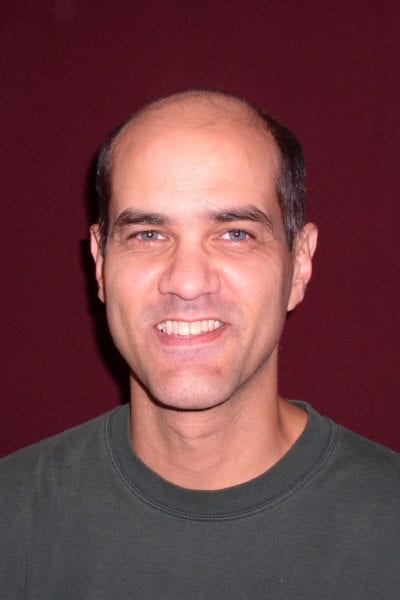
Bob Hicok’s Water Look Away was published by Copper Canyon Press in 2023. He has received a Guggenheim and two NEA Fellowships, the Bobbitt Prize from the Library of Congress, nine Pushcart Prizes, and was twice a finalist for the National Book Critics Circle Award. His poems have been selected for inclusion in nine volumes of the Best American Poetry.
ELLEN BASS
Bringing Flowers to Salinas Valley State Prison
When Mr. H. saw the little meadow blooming
on the steel table, he bowed to the starry faces of jasmine.
This is the first flower I’ve smelled in twenty years.
And when I slid each man a bouquet in a paper cup
Mr. M. said, I’ll have such a short time with these.
We spoke, then, about Beauty and Loss,
the great themes of poetry.
And when our time was done,
and the guard said they had to leave the flowers,
most of the men acquiesced. But Mr. S.
insisted he had, as a Native American, a right
to his rituals—sage, sweet corn, tobacco—
and no one could stop him—it was the law—
from taking these sacred plants back to his cell.
Then he raised his cup and drank
the water the flowers were drinking
and a small wind stirred in that windowless room
as we watched Mr. S. quietly bite
the heads off the Peruvian lilies,
crushing their pink sepals and the gold
inner petals flecked with maroon, swallowing
the silvery filaments, their dark
pollen-laden anthers, his mouth frothing with blossoms.
Ellen Bass
from Indigo (Copper Canyon Press, 2020)
Some years ago I was teaching a poetry workshop at Salinas Valley State Prison. It was spring and it seemed a particularly gorgeous spring with flowers blooming all over my city. I kept feeling this irrational wish that I could bring the men in my workshop out just for the day—like a field trip—to see and smell the flowers. Since that wasn’t possible, I decided to try to bring the flowers to them. What you were allowed to bring into the prison varied depending on the guard on duty, but I thought it was worth a try. I collected flowers, stripped thorns from roses, and made a dozen little bouquets in paper cups that I arranged in a low cardboard box. I felt like Demeter carrying those flowers out in front of me. It still surprises me that not only was I allowed in, but no one I passed even seemed to see the flowers. The rest is in the poem. After I wrote it, I showed it to Mr. S because I wanted to make sure he didn’t object. He read it and then looked up at me and said, “I did that.” It was a moment that made clear the power of poetry to reveal us to ourselves.
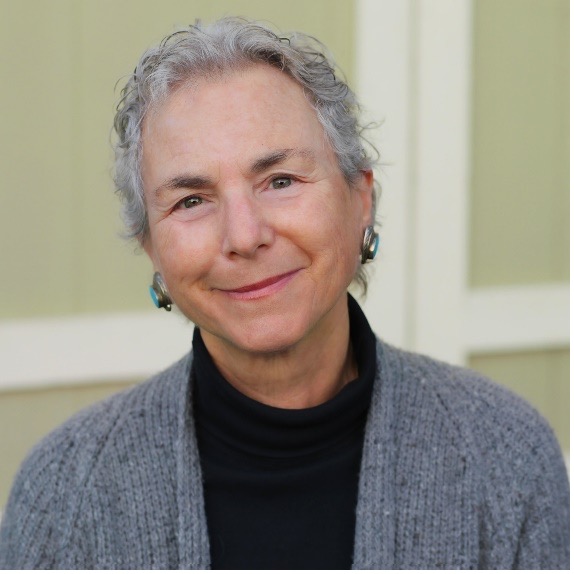
Ellen Bass’s poetry collections include Indigo, Like a Beggar, The Human Line, and Mules of Love. Among her awards are Fellowships from the Guggenheim Foundation and The NEA, The Lambda Literary Award, and four Pushcart Prizes. With Florence Howe, she co-edited the first major anthology of women’s poetry, No More Masks! and she co-authored the groundbreaking, The Courage to Heal: A Guide for Survivors of Child Sexual Abuse and Free Your Mind: The Book for Gay, Lesbian and Bisexual Youth—and Their Allies. A Chancellor Emerita of the Academy of American Poets, Bass founded poetry workshops at Salinas Valley State Prison and the Santa Cruz jails, and teaches in Pacific University’s MFA program.
ELIZABETH BRADFIELD
Sissy-Fists
was my favorite costume of the Carnival
parade. Pink sateen shorts, pink boxing
gloves, papier-mâché rock mounded
in a small shopping cart. I could never
be that witty about my burdens,
not even if I tried real hard. He was gray,
wiry. Spine curved like he’d been taking
a nap draped over a boulder. Sisyphus
is such a dumb myth. The rock. The
hill. Pushing. Repeat.
Why didn’t he just walk away? There must
have been something serious at stake.
In the parade, his laurel was of lamb’s ears,
his sash fixed by a gold brooch. Afterwards,
we had one of our familiar arguments,
and again I knew I wouldn’t be the one
to leave. I like the rough of granite. It keeps
my palms nice and smooth. I like the way
my triceps look now, after all these years.
Often, a poem is a space for me to explore why a moment has resonance. I loved that Sissy-Fists costume—it cracked me up, and I kept thinking of it for months after the annual Carnival parade in Provincetown. When an image or incident sticks with me, I know there’s something deeper there, murmuring, asking to be considered. In this case, I recognized something in the original myth within myself, and I also envied the light humor of the costume and felt my own inability to carry a burden with such sparkly drollness. Creating a witty demonstration of suffering is such a campy thing to do, an act of survival that feels particular to queer culture. I wanted to honor this man’s spirit by both documenting it and taking seriously what might inspire it—and, not knowing him, the only thing I could do was ask why I might choose to wheel that cart myself, what Sisyphean task I am willing to repeat.
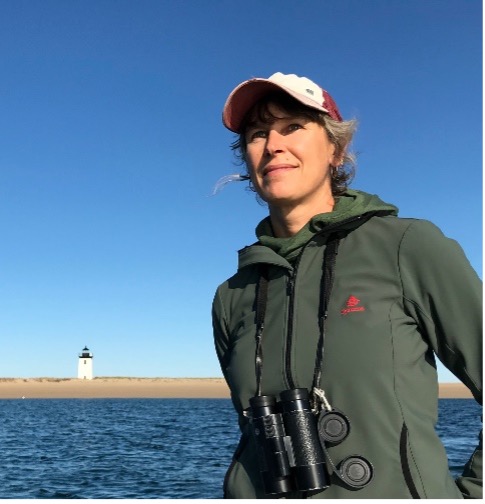
Elizabeth Bradfield is the author of five poetry collections, most recently Toward Antarctica, and co-editor of the anthologies Cascadia Field Guide: Art, Ecology, Poetry and Broadsided Press: Fifteen Years of Poetic/Artistic Collaboration. Editor-in-chief of Broadsided, Liz lives on Cape Cod, works as a marine naturalist, and teaches at Brandeis University. www.ebradfield.com
JILL MCDONOUGH
3 am
Our cabdriver tells us how Somalia is better
than here because in Islam we execute murderers.
So, fewer murders. But isn’t there civil war
there now? Aren’t there a lot of murders?
Yes, but in general it’s better. Not
now, but most of the time. He tells us about how
smart the system is, how it’s hard to bear
false witness. We nod. We’re learning a lot.
I say—once we are close to the house—I say, What
about us? Two women, married to each other.
Don’t be offended, he says, gravely. But a man
with a man, a woman with a woman: it would be
a public execution. We nod. A little silence along
the Southeast Corridor. Then I say, Yeah,
I love my country. This makes him laugh; we all laugh.
We aren’t offended, says Josey. We love you. Sometimes
I feel like we’re proselytizing, spreading the Word of Gay.
The cab is shaking with laughter, the poor man
relieved we’re not mad he sort of wants us dead.
The two of us soothing him, wanting him comfortable,
wanting him to laugh. We love our country,
we tell him. And Josey tips him. She tips him well.
Jill McDonough. Reprinted by permission of Salt Publishing.
There is a way that being a nice middle aged white lady gives you a kind of access to the world that you don’t get as a younger person, or a person who doesn’t have this face. I get to call everyone “sweetheart,” or “baby,” for example. People aren’t afraid of me or threatened by me and I guess there is something calming about having a mom-like person around smiling at you and telling you that you are doing a good job.
The process of writing this poem was that this kind of thing happens to me a lot. I get to charm someone who is upset about something and then we all feel better. It’s a magic trick of middle age. It’s also fun that I am too old to be out at 3am but of course I am out at 3am because that’s when the good stuff happens. The Other here is Me and Josey, for this cabdriver; we’re the weirdos who deserve to die. But, darn it, he likes us! What are you going to do?
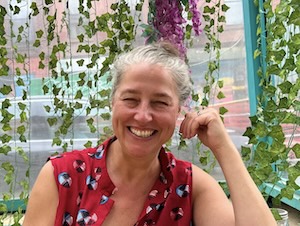
Jill McDonough is the author of American Treasure (Alice James, 2022), Here All Night (Alice James, 2019), Reaper (Alice James, 2017), Where You Live (Salt, 2012), Oh, James! (Seven Kitchens, 2012), and Habeas Corpus (Salt, 2008). The recipient of three Pushcart prizes and fellowships from the Lannan Foundation, the National Endowment for the Arts, the Fine Arts Work Center, the New York Public Library, the Library of Congress, and Stanford’s Stegner program, she taught incarcerated college students through Boston University’s Prison Education Program for thirteen years. Her work has appeared in Poetry, Slate, The Nation, The Threepenny Review, and Best American Poetry. She teaches in the MFA program at UMass-Boston and started a program offering College Reading and Writing in two Boston jails. Her website is jillmcdonough.com.
DAVID LAVERTY
Seventeen Things About Fire
(1) If a man dies on a strip club floor the show never stops
(2) despite your thumping his chest to the low bass
beat. (3) The crowd will still pay the cover and stumble past
his hardening meat on the way to Pervert’s Row.
(4) Steam burnt skin sheds like steam cooked chicken—
right off the bone. (5) You’ll wear the smell for a lifetime.
(6) This is longer than it will take to pick him off
your coat.
(7) Later, you’ll pick away at the chicken dinner
and think; (8) fuck
what a job, and
(9) why can’t the Probies cook?
(10) Later still, you’ll pick away at the scars.
(11) Your soon-to-be ex will try to axe
through (12) the whiskey-walled safe room (13) while
the living try howling louder than the dead.
And (14) you’ll wonder how the hell
Hollywood forgot this story (15) when you wave
to the little girl from (16) the pretty red truck
(17) screaming past the corner.
For over twenty years, my work has been fighting fires in an Ontario city. Sometimes I like addressing fire in my poetry, as subject, object, or metaphor. Mostly, though, I avoid it. I wrote Seventeen Things About Fire in an exhausted state after finishing a call, and in it I explore the associations that come with the job and the uniform: victims of conflagrations; nightlife; smells; the shared life of a firehall. Fire burns, and not just its victims, but also those who fight it. Other people look at us — the little girl waving — and sometimes I see what she sees: beyond my own exhaustion, I see the safety she seeks, the need for a calming of a chaos. Seventeen Things About Fire starts as something to tell others about the life of a fire captain, it ends with a volta: the gaze turned on me, the heat too.

David Laverty (b. 1975) is a poet from Ontario, Canada. He has served as an urban firefighter for over twenty years and brings interests in mythology, work, and power to his writing. His poetry appears in The Cortland Review, The Night Heron Barks, Dumbo Feather, and elsewhere.
JOSEPH MILLAR
Young Mother
Someone should take her picture
right there under the Bud sign,
uneasily eyeing the slight wrists of the waitress
bringing grilled cheese and soup.
She’s trying to have a quiet lunch,
hair pinned evenly back from her face,
nails painted red and flat shoes crossed at the ankles.
There are jagged gaps of hunger constantly opening
in the skin of the world. Imagine the great breasts,
veins branched under the flame-shaped stretch marks,
nipples chapped and starting to leak when the black
newborn two booths away starts to wail.
Three years out of high school, her milk lets down
towards the wispy voice, while she looks on,
embarrassed, easing her body forward
over the pastel formica. Whose mother is she?
The lips of the homeless man by the bridge
unfasten from the jar, now drained of its wine,
as he waits for the rivers of sleep to carry him down.
And the hitch hiker standing along west of town
watches the tall wheat bend on the wind,
remembering the blanket covered with stars
she wrapped him in at bedtime.
She’s everything we need in her loose skirt from Penney’s,
the sun spreading out on the table top and her water glass
casting its blossom of light sideways over the floor.
She leans forward, eyes narrow, watchful and tense,
tears into the sandwich like a dog. The new milk clotting her blouse.
From Overtime, Carnegie University Press, 2013
This poem came about as a result of my wife explaining to me the phenomenon of involuntary lactation. It made me think of the ending of Steinbeck’s Grapes of Wrath, and it seemed a marvelous metaphor for the oneness of mankind and the tenderness and generosity of motherhood, which is where we all came from.

Joseph Millar’s newest collection, shine, is due out from Carnegie-Mellon this fall. His work has won fellowships from the NEA and the Guggenheim Foundation.
NANCY MILLER GOMEZ
Baby Facing the Wrong Way at the County Jail
A woman enters the waiting room
carrying a baby strapped into a car seat.
She sets him down so he is facing me.
Tucked under a heavy blanket, all I can see
is the round disc of his face.
Behind his pacifier, the edges of his mouth
flicker. I know he’s smiling because of the pleats
around his eyes. I smile back and he smiles bigger.
He’s a happy baby. How old is he?
I ask the woman who is reading a magazine
and seems to have forgotten
the baby at my feet. She looks up and I watch
her mind chew through my question.
Seven months maybe. Or eight, she says
then adds, He isn’t my baby.
So, whose baby are you? I wonder.
I work for the state. I bring him here
to visit his father, the woman says
as the baby continues to smile
at the metal detector, the linoleum,
the folding chairs, the fluorescent lights
shining on everything ugly in that room.
The inspiration for “Baby Facing the Wrong Way at the County Jail” was pure happenstance, an unexpected gift from the Poetry Gods. The waiting room at the county jail was one of the most institutionally bleak spaces I’ve ever spent time in. Metal stacking chairs. Cinderblock walls painted a tumorous green. Grey linoleum floors flecked with odd splotches of clashing colors that I’ve always thought must have been designed to be so hideous you’d never need to clean a spill. Portraits of the sheriff and his predecessors lined the walls, everything bathed in a glare from the overhead lights. The fluorescent buzz made the space even more cold and menacing. And into all that ugliness a woman walked in carrying a baby in a car seat. The incongruence of a baby in that place unsettled me. I couldn’t take my eyes off the baby, and I was perplexed by the woman’s complete lack of interest in him. She’d plunked him down on the floor like a suitcase and didn’t even bother to turn his carrier so she could watch him. I was there waiting to be escorted in to teach a poetry class, and here was this baby at my feet, smiling up at me, accompanied by a woman who worked for the state who seemed indifferent to his existence. And yet, his face, that smile. So much beauty amidst so much loss and pain.

Nancy Miller Gomez’s first full-length collection is forthcoming from YesYes Books in 2024. She is the author of the chapbook, Punishment (Rattle chapbook series), a collection of poems and essays about her experience teaching in prisons and jails. Her work has appeared in Best American Poetry, Best New Poets, Prairie Schooner, The Adroit Journal, New Ohio Review, Shenandoah, River Styx, The Rumpus, Rattle, Massachusetts Review, American Life in Poetry, Verse Daily, and elsewhere. She received a special mention in the 2023 Pushcart Prize Anthology. She co-founded with Ellen Bass an organization that provides writing workshops to incarcerated women and men and has taught poetry in Salinas Valley State Prison, the Santa Cruz County Jails, and the Juvenile Hall. She has worked as a waitress, a stable hand, an attorney, and a tv producer. She lives with her family in Santa Cruz, California. More at: nancymillergomez.com.
PADRAIG Ó TUAMA
Jacob and Esau
I repented my resentment having realized
I’d forgotten to repeat it.
For a while – for a long while – it was like a prayer,
rising to the skies every morning.
I remembered other things instead: the way I walk
lighter these days. The way you didn’t know
my story of divorce. The way I am tired of being
forced among the new; and the way I miss having someone to speak to
about things I don’t need to explain. The way we shared a name.
I missed your body, your smell,
your wrestle, your snoring breath.
I took a flight and hung around where we used to meet.
I couldn’t eat. I waited. I watched.
And when I saw you, I got why I came, I saw you’d changed too.
So much behind us we didn’t need to name.
When I think of this question, Sally, I think of what the French psychoanalyst Jacques Lacan said about the word étrange. That word, meaning “strange” is also a homophone for “être ange” meaning “to be an angel”. The otherness of grief is also a way in which grief is an other, an altered state of being. Grief allows me to tell the truth, somehow in the face of shock and endings, there is a capacity to name what is; threat seems diminished. Grief, in this instance, deepened integrity and vision.
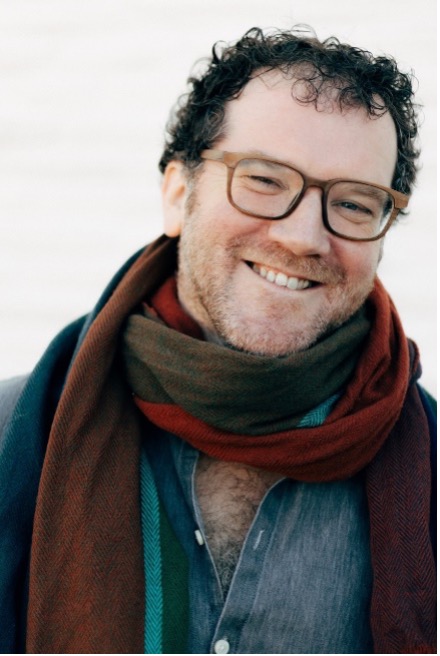
Photo credit, David Pugh
Pádraig Ó Tuama (b. 1975) is the host of On Being’s Poetry Unbound and the author of Poetry Unbound; 50 Poems to Open Your Life. He is a poet with interests in language, violence, power and religion. Kitchen Hymns is forthcoming from Copper Canyon Press in October 2024 as is 40 Poems On Being With Each Other; A Poetry Unbound Collection from WW Norton.
MATTHEW OLZMAN
The Earthlings (5)
After the Earthlings arrived, we watched them closely.
This Earthling hit another Earthling over the head with a pipe.
This Earthling removed the kidneys of a sleeping Earthling
and wore them as jewelry until the novelty wore off.
This Earthling looked up at the stars, asking occasionally,
which part of that shimmering preponderance had been its home.
What is nostalgia? it would say. What does it mean to be abandoned?
This Earthling evolved so fast.
This Earthling was astonished that the same species
who imagined how to perform a heart transplant
also invented the guillotine and Cyclone B.
The irony of it all, this Earthling announced, shaking its head.
This Earthling wrote poems about injustice.
This Earthling read those poems to a small crowd of Earthlings
who applauded vigorously and, to show their appreciation, shoved
a smaller Earthling into one of our Protoplasm Obliterators.
And this Earthling, whenever we’d gasp, My God,
what have you done? would look up at us with those eyes,
always on the verge of heartbreak,
and just stand there, staring at us.
“The Earthlings (5)” is part of a linked series of poems asking what it is to be human (and among all the paradoxes and messy complications of that enterprise). In thinking about the concept of “otherness,” in this poem the idea of “other” is blurred. What is normal? Perhaps to the speaker, the human is other, though by definition, the “alien” is the universal outsider, strange, and unknowable. I think, in this poem, I find a more of kinship with the speaker/extraterrestrial, which is really a defamiliarizing mirror held up to the oddness of humans. And defamiliarization, in the traditional Shklovsky sense of the word, is meant to slow us down, make us pay attention to what we’d overlook, and bring us closer to ourselves and the world we live in.

Matthew Olzmann is the author of Constellation Route as well as two previous collections of poetry: Mezzanines and Contradictions in the Design. A recipient of fellowships from Kundiman, MacDowell, and the National Endowment for the Arts, Olzmann’s poems have appeared in the New York Times, Best American Poetry, The Pushcart Prizes, Kenyon Review, and elsewhere. He is an assistant professor at Dartmouth College and also teaches in the MFA Program for Writers at Warren Wilson College.
BETSY SHOLL
Alms
Small as a fly bump, the little voice
behind me calling Miss, Miss, wanted
a dollar, maybe for food as she said
in that voice of mist, so plaintive
and soft it could have come from inside
my own head, a notch below whisper,
voice of pocket lint, frayed button hole,
voice of God going gnat small. I shivered
and stopped. I looked for the source,
and there it was again, Miss, so slight
it wobbled moth-like on air,
up from a bare trash-filled recess
beside the post office steps. Yes,
I gave the dollar. But I had seven
in my wallet, so clearly that voice
wasn’t small enough, still someone
else’s sorrow, easy to brush off—
till later that night, in bed, I heard it
again, smaller—miss, miss, little fly strafe
troubling sleep—not a name at all,
but a failure, a lack, a lost chance.
House of Sparrows: New and Selected Poems, University of Wisconsin, 2019.
I often feel my poems are smarter than I am. They say what they say and then shut up and leave me to make a stumbling comment in their place. This poem started with an actual experience and the way it haunted me afterward. The woman really did call out, “Miss, Miss” in a very small voice I almost didn’t hear, and that voice felt intimate, almost as if it had come from inside me. I found myself focusing on that voice and its effect on me. It felt heartbreaking in a way a strident voice rarely does. I thought about how before such vulnerability our own barriers and defenses can drop. I didn’t empty my purse, and I thought about that all night. What did I miss? Maybe for a moment I would have held nothing back. I might have known a kind of emptiness that is also a kind of freedom and joy.

Betsy Sholl’s tenth collection of poetry is As If a Song Could Save You (University of Wisconsin Press in fall of 2022), winner of the Four Lakes Prize. Her ninth collection is House of Sparrows: New and Selected Poems (University of Wisconsin, 2019). She teaches in the MFA in Writing Program of Vermont College of Fine Arts and served as Poet Laureate of Maine from 2006 to 2011.

